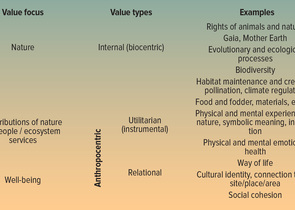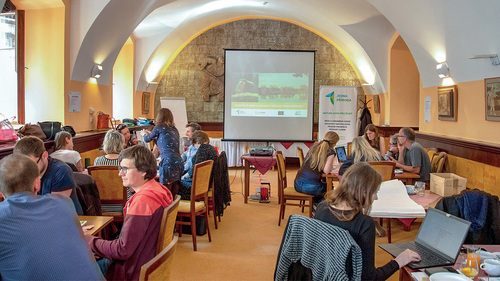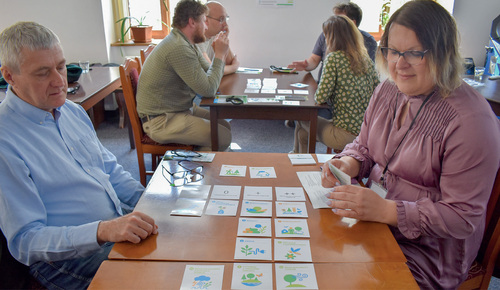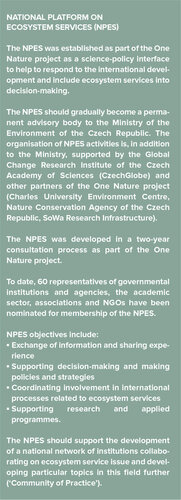Nature Conservation 2023 — 5. 6. 2023 — Focusing on the Public — Print article in pdf
The National Platform on Ecosystem Services in the international context of nature conservation and

A founding meeting of the National Platform on Ecosystem Services (NPES) was held within the framework of the integrated LIFE project One Nature in Prague in October 2022. The establishment of the Platform reflects a long-term development in ecosystem service assessment both in the Czech Republic and abroad. We are at present witnessing a shift in nature conservation goals and ways which have been increasingly including ecosystem services, nature´s contributions to people and in a broader context nature´s values. The aim of this article is to take a closer look at the present NPES context and objectives especially from the perspective of plural natural values and ecosystem service assessment in relation to ecosystem conservation and restoration following the international context.
International context
At present, the issue of ecosystem services is treated at many levels, so the NPES has not arisen in a vacuum. The concept of ecosystem services (ES), i.e. benefits provided to human society by nature, was introduced as a central principle of the Millennium Ecosystem Assessment megascientific project (MA 2005). Since then, scientific research on ecosystem services has exploded. One of the results was the establishment of international platforms, e.g. the Ecosystem Services Partnership, and the initiation of several other processes like The Economics of Ecosystems and Biodiversity (TEEB). The effort of international nature conservation conventions, international organisations and individual governments led in 2012 to establishment of the Intergovernmental Panel for Biodiversity and Ecosystem Services (IPBES – see PLESNÍK 2016). The IPBES is now the main science-policy platform, developing an agenda including thematic assessment reports (IPBES 2019).
At the pan-European level, in the EU, Mapping and Assessment of Ecosystems and their Services (MAES) is taking place. The technical report summarises the hitherto knowledge of the state of ecosystems and ecosystem services on the EU territory and supports the assessment of targets to be reached in biological diversity until 2020 (MAES et al. 2020). It also provides a database for future assessment and development of policies, particularly with regard to an ecosystem restoration programme for the next decade (2030). Assessments of ecosystem services are also being carried out in individual countries (UK NEA 2011, SCHRÖTER et al. 2016). It is further important to mention the newly developing ecosystem accounting SEEA EA (UN 2021). SEEA EA is an integrated and comprehensive statistical framework for organising ecosystem data, measuring ecosystem services, monitoring changes in ecosystem activities and connecting the information with economic and other human activities. In 2021, a basis for accounting the size/coverage and state of ecosystems as well as biophysical flows in ecosystem services was adopted as an international statistical standard.
The concept of ecosystem services has also seen several shifts. One of them is that from a focus on instrumental benefits of ecosystems for society to an emphasis on different natural values. Whereas the main ecosystem service studies formerly stressed the economic contribution to human well-being (COSTANZA et al. 2014), they now – following the IPBES conceptual framework – emphasise diverse value and knowledge frameworks, including the intrinsic value of nature and relations of different communities to the natural environment. The complexity of the problems to be solved requires a diversity of views, knowledge and experience. We are moving from univariate assessments, such as the mentioned monetary expression of the value of nature, to a more integrated approach taking into account diverse values and attitudes, combining different methodologies and involving the relevant actors.
Another shift can be observed in the generally broad gap between scientific knowledge and common nature conservation practice. Although the scientific and methodological basis of ecosystem service assessment and its benefits is presently rather extensive and established, the concept of the benefits of nature has not been fully integrated and applied in the nature conservation and restoration practice. Part of this exchange at the interface of science, policy and practice is the co-production of knowledge (BALVANERA et al. 2020), often as part of a more or less formalised dialogue or participatory and transdisciplinary approaches. The NPES is thus established in the context of international development, also responding to the present requirements having been emerged in the Czech Republic.
Plurality of natural values
Natural values not only influence the attitude of the public to nature conservation and environmental behaviour of people, but also the approach to ecosystem management and governance and their benefits following existing or prepared strategic and legislative instruments. The NPES, representing a science-policy interface process supporting nature conservation and restoration, must necessarily be based on a pluralistic framework of the values and benefits of nature. An appropriate conceptual framework is provided by the IPBES (2019), which attempts to include a wide range of perspectives and natural values as well as different voices from the scientific community, governmental institutions and civil society. Therefore, the conceptual framework of the One Nature project was developed on the basis of the IPBES conceptual framework.
Natural values are broader than just a benefit for people (Fig. 1). Its intrinsic value expresses the significance and meaning of nature itself, regardless of human use. We can view the intrinsic value of nature from a biocentric perspective but also in the context of various cultures, expressed by the IPBES as Gaia or Mother Earth. It reflects ethical aspects of life on Earth, evolutionary relationships, genetic diversity and animal rights and finally also the right of nature as such. Connected concepts in the anthropocentric framework include the existential value of nature and of the value of its legacy for future generations expressing economic preferences for the preservation of nature without direct utilisation.

Fig. 2. Participatory approaches allow a discussion of values in various contexts. Participatory seminar in the Třeboňsko/Třeboň basin Protected Landscape Area and Biosphere Reserve. © David Stella / One Nature.
The utilitarian (instrumental) value of nature focuses on human use of nature and mostly overlaps with the concept of ecosystem services. It includes material and regulatory benefits which may be used by people directly as products, recreation and protection against natural disasters or indirectly as climate change regulation, water quality security and pollination. These utilitarian types of benefit are also the most frequent subject of ecosystem service economic assessment.

Fig. 3. Prioritising the benefits of nature for assessment in the Křivoklátsko Protected Landscape Area and Biosphere Reserve. © Jitka Kozubková / One Nature.
Immaterial benefits of nature partly overlap with cultural services provided by ecosystems, but are increasingly incorporated into the framework of relational values. Relational values are linked to fulfilling relationships and that what people find meaningful on nature, e.g. identity, responsibility, commitment or care. They include relationships between people and nature as well as mutual relationships between people through nature (CHAN et al. 2016). Relational values can also be linked to relations to nature in order to achieve a well-being. They are very closely linked to the benefits of nature for social cohesion and for maintaining identity.
Towards participatory assessments
To a certain extent, natural values co-determine the approach to assessing ecosystem services. Different types of values are not always mutually commensurate. For example, the intrinsic value of nature or maintaining identity cannot, on principle, be converted to money, or at least it does not make sense to do so. By contrast, utilitarian benefits can be expressed as an economic value which allows, inter alia, a comparison of their benefits with the costs of restoring ecosystems. Ecosystem service flows can similarly be measured in biophysical units or their significance expressed in a socio-cultural assessment. With regard to this diversity, the NPES will necessarily represent different views of and orientations at natural values depending on the priorities in ecosystem assessment.
There is a huge range of approaches to assessing the benefits of nature but there is not one ‘right’ approach. The choice of approach reflects the goals and purpose of the assessment as well as the overall decision-making context. Approaches to ecosystem service assessment are usually divided into biophysical, economic and sociocultural ones. In the same way, ecosystem services can be assessed qualitatively, quantitatively or in monetary units. Many approaches, however, combine and integrate various methods at different levels of complexity, e.g. an analysis of synergies and trade-offs or ecosystem accounting. Regarding the requirements to integrate different views and values, the importance of participatory methods, which structurally involve stakeholders into the assessment process, grows just like their application in nature conservation.
It is the participation of involved actors, including local knowledge and easier communication, are among key factors in selecting the method of ecosystem service assessment (HARRISON et al. 2018). More advanced approaches use deliberative methods where participants seek agreement or share their views on the benefits of nature. In protected areas, for example, we have applied participatory development of life value scenarios (HARMÁČKOVÁ et al. 2021). Similar approaches have also been developed in case studies under the One Nature project in the selected Natura 2000 sites (Figs. 2 and 3), allowing for the mentioned process of knowledge co-production (NORSTRÖM et al. 2021).

Role of the National Platform
The Convention on Biological Diversity´s Strategic Vision speaks on living in harmony with nature by 2050, the EU Biodiversity Strategy for 2030 on bringing nature back into our lives. All these appeals are part of a broader awareness of the need for a transformation change towards sustainability in which a satisfactory well-being is not in conflict with the health and integrity of the biosphere. The strategic objectives of nature conservation and restoration cannot be fulfilled without dialogue and cooperation of multiple actors/stakeholders who influence the state of nature and its services, participate in its restoration and benefit from various services that nature provides to people. Different values and attitudes are not mutually exclusive and do not have to lead to different results in nature conservation and restoration. At the same time, they support for inclusive nature conservation (TALLIS & LUBCHENCO 2014).
The aim of the National Platform on Ecosystem Services is to support a science-policy dialogue on ecosystem services in the Czech Republic (Box 1). Assessment of ecosystems and their services they provide is defined as a social process through which scientific knowledge of the causes of changes in ecosystems, their consequences for human well-being and management and policy options are assessed, and which links various fields of knowledge in a useful way to support decision-making (ALLISON & BROWN 2017). This requires a structured discussion between the scientists, politicians and other key actors. All the above-mentioned processes and strategic goals demand a coordinated approach and involvement of relevant actors/stakeholders.
The NPES was established under the One Nature project and should gradually become an advisory body to the Ministry of the Environment of the Czech Republic. The vision and objectives of the Platform will undoubtedly develop further according to the needs and requirements in ecosystem service assessment. Thanks to its composition, including representatives of different sectors, academia and NGOs, it provides a suitable basis for the development of an informational and science-policy interface for ecosystem service issues. We must not ignore possible pitfalls turning the NPES into a static body without sufficient inclusion and diversity. In addition to its main objectives, the NPES should further find ways to take into account, share and communicate a wide range of natural values related to benefits for people. All this may also contribute to a higher integration of ecosystem services and values into the conservation and restoration of ecosystems.
---
Acknowledgement
This article was written as an output of the One Nature project (LIFE-IP:N2K: Revisited, LIFE17/IPE/CZ/000005).

